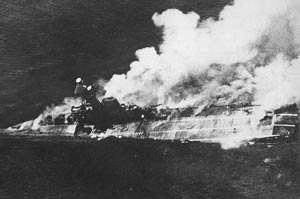This refers to R.L. Devarajah’s wonderful article on Ceylon’s Pearl Harbour Attack which appeared in your edition of April 11. I was stricken with goose bumps whilst reading the narrative as it invoked in me nostalgic memories of events that I lived through during that unforgettable period.
I was 14 years old at the time and was living down Digarolla way in Moratuwa, in a house almost on the banks of the Digarolla River. I was studying at St. Sebastian’s College. Our education was not confined only to student activities. We were being trained to play our part, in no small way, to assist in wartime activities as well.
We were inducted into an organization known as ARP (Air Raid Precautions). Our primary duty was to administer First Aid to air raid casualties; so we were put through a comprehensive course by the District Medical Officer and his staff to treat all types of injuries such as cuts, bruises, burns, open wounds, even dislocations and fractures.
 |
| The ship Hermes sinking after Japanese attack |
A haversack containing First Aid equipment and a steel helmet were issued to each one of us while pre-determined posts were allocated to us to be manned as the “Alert” was sounded. Practice runs were regularly carried out. As the sirens started wailing we would push our books aside, grab our equipment and rush to our respective posts. Simulated cases of casualties were brought for treatment, which was done to perfection. At the “All Clear” we went back to our books.
In addition to First Aid, a sergeant from the Royal Signals Regiment trained us in Aircraft Recognition. We became so good in this field we could, at a later stage, identify aircraft just by the sound of their engines without even taking a peek at them.
And finally the fateful day dawned. April 5, 1942. Easter Sunday. It was an overcast, cold and cloudy morning with a thin drizzle outside. We were getting ready to go for Mass at St. Sebastian’s Church, which was just a stone’s throw away when I heard the mighty roar from above. I was convinced the Japanese had come. I rushed out and looked up, and there they were, a squadron of about twenty five planes with square wingtips moving towards Colombo in a square formation and more following.
I yelled to my father, who was inside the house, that the Japanese had finally come. My father who had been a soldier in the First World War was one hundred per cent pro-British and according to him no power on earth could get the better of them.
As such he replied that the Japanese would not dare attack Ceylon. Later we heard the sound of gunfire and looking up towards Colombo we saw the dog fights taking place and the whole area lit up by their gun flashes. When I pointed those out to my father his response was that the Royal Air Force was carrying out a dummy run. I decided to leave it at that.
At that time my father was building the new concrete bridge connecting Wellawatte and Dehiwela. He travelled to work by train, minimizing the use of official and private vehicles as petrol was heavily rationed. During school holidays I used to accompany him to his work site. So, as per custom, when I went with him the day after the raid we saw the wreckage of a couple of planes both Japanese and RAF that had been shot down. On arrival at the bridge site we observed that practically all the buildings in the area were closed, the entire region was desolate and deserted. Galle Road was devoid of any life, but was full of dog-fight debris, shiny brass cartridges of spent ammunition.
Our doubting Thomas was quite pensive in a melancholy manner; so I left him alone although I was sorely tempted to needle him on his biased attitudes. By and by he muttered to me that I was correct all along. A few days later we heard about the devastating aerial attacks on Trincomalee and other outlying areas in the EAST.
When Squadron Leader Leonard Joseph Birchall took off on that historic reconnaissance flight on April 4, 1942, he displayed qualities of initiative, leadership and bravery of a high order. His heroic and death defying actions saved not only Ceylon and possibly parts of the sub-continent from destruction, devastation and carnage, but also served as the impetus which triggered the retreat of the enemy forces, which eventually ended with their unconditional surrender. He deserved much more than the Distinguished Flying Cross he was awarded.
About 15 years later whilst serving in the then Royal Ceylon Navy, I was sent on an assignment to the Royal Naval Armament Depot which was housed in the premises of the Trincomalee Base. My task was to carry out some research work on naval munitions with the assistance of British Admiralty personnel who were in charge of the establishment.
One day the subject under discussion was the Japanese attack on the Trincomalee Base, and during the course of the conversation one of the officials told me in confidence that a couple of British traitors were passing vital information to the enemy on miniature radios which were disguised as wrist watches.
I congratulate Mr. Devarajah for his most precise and enlightening article. Where he got his facts, figures and photos are beyond me. I am preserving his documents for reference purposes.
P. Alles,
Lieut. Comdr (Rtd), Sri Lanka Navy |
